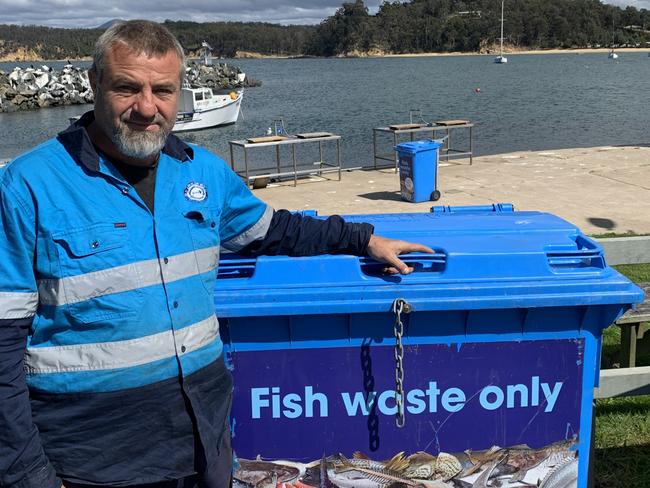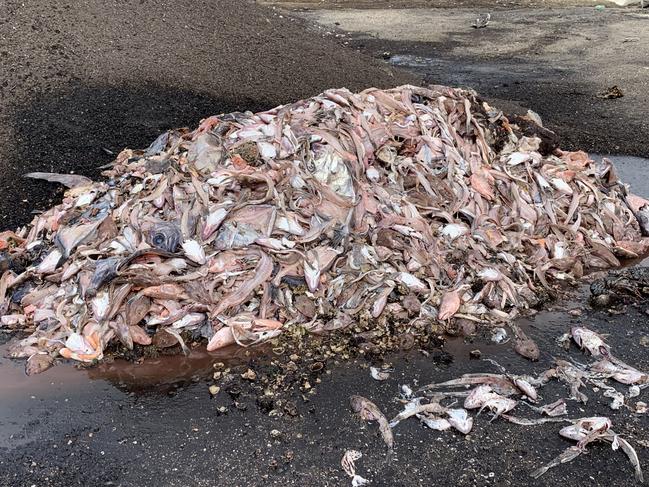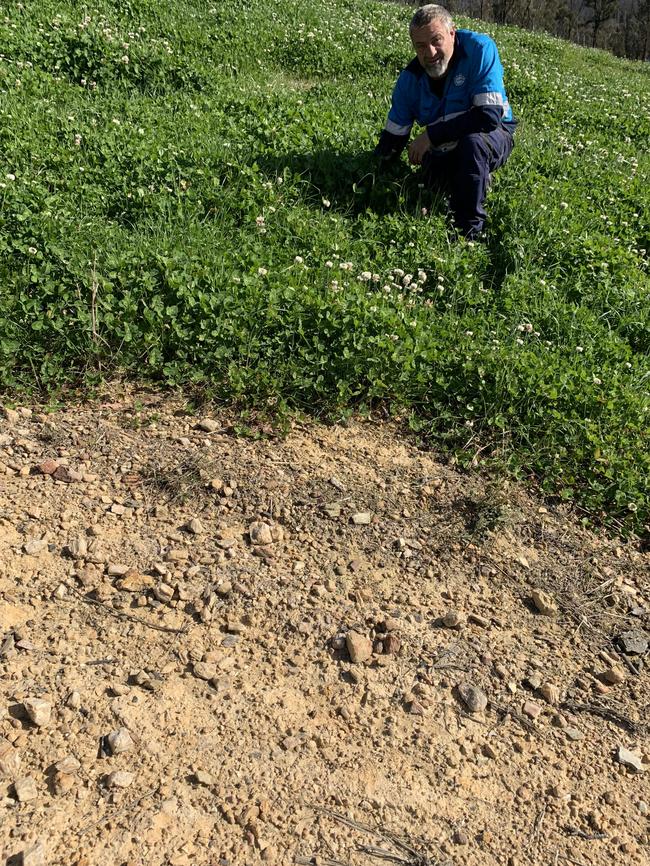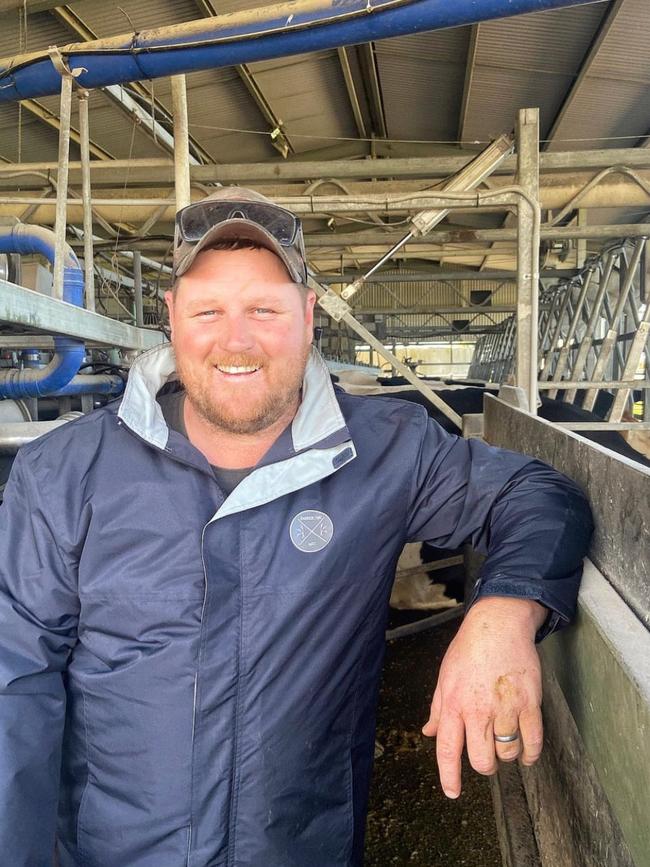Ocean2earth compost: Marine waste fertiliser solution for farms
A unique liquid compost made from marine waste is proving a silver bullet for Bega Valley dairy farmer Toad Heffernan.
The South Coast News
Don't miss out on the headlines from The South Coast News. Followed categories will be added to My News.
Two brothers turning discarded waste from the fishing and forestry industries into compost are not only diverting hundreds of tonnes from landfill each year but raising heads in the farming sector.
A trial on a dairy farm at Candelo in the NSW Bega Valley has revealed that using the fish compost as a diluted foliar spray can help deter red-legged earth mite, increase frost resistance in crops, and fast track soil health with beneficial microbes and potential carbon sequestration.
Tim and Kyran Crane launched their war on waste and circular economy business Ocean2earth Australia three years ago and are the first and only company in Australia to have government approval to sell marine based compost.
Tim, who has a background in the garbage, fishing and forestry industries, and Kyran, a marine biologist, both had a passion for recycling and were dismayed at the huge amounts of marine and forestry waste going to landfill.
“We were thinking this is really wrong, why isn’t someone doing something with this resource,” Tim said. “We had to try and do something about it.”
FROM TRASH TO TREASURE
The pair initiated talks with NSW Bega Valley Shire Council and now have a contract in place to collect organic marine waste from seafood processors and boat ramps via specially marked bins.

The waste is transferred to an EPA approved composting facility at Merimbula, NSW, and mixed with pine bark sourced from sustainable local pine plantation mills.
The compost piles are turned regularly, pasteurised and aged for six months until the fish is completely broken down and turned into a sea mineral compost.

“It is a living soil with a diverse population of beneficial microbes,” Tim said.
“It has a marine based component providing the protein feedstock, and a wood-based component providing the carbohydrate feedstock to stimulate the perfect culture of microorganisms for a fully living soil.
“The sea minerals improve the structure of your soil and increase your soil’s ability to absorb and retain moisture plus boosts plant immunity to help reduce the risk of plant diseases.”
ON-FARM BENEFITS
The compost was initially designed for the home gardener but has farmers with a regenerative agriculture focus like Toad Heffernan, excited.
The Candelo, NSW, dairy farmer said he saw a test site on Tim Crane’s property at Kiah, NSW, where a pasture blend of clover, rye grass and millet was grown in an inch of the marine compost. It had sequestered carbon down to 100mm in 11 months.
“I looked at the soil he was growing it on and it was the quality of concrete and I went mate, this is the duck’s guts,” Toad said. “To see the stems on the clover and the rye-grass, it was solid.”

In conjunction with Tim and an agronomist, Toad began trialling the compost on his own 400 cow dairy property to help improve soil and animal health. A liquid tea extract created from the compost was used as a foliar spray to deter pests.
“The tea brought our Brix (sugar levels) up from the six to 12 mark,” Toad said.
“I had a red-legged earth mite problem in that paddock that was slowing things down and within two hours of applying the tea they were gone. It was exciting not to have to use insecticides that would have knocked the microbes around.”
The paddock sprayed with the tea was also frost resistant.
“I took a photo standing on the frost line and in that paddock was nothing. It was bizarre. I put that down to the microbes building up in the soil that’s allowing the soil not to get as cold,” Toad said.
“We are a dryland farm and we have a lot of kikuyu. If I can spray a lot of tea on the kikuyu I might get another month out of it before it goes dormant so it will shorten the winter drought.
“We’ll keep doing the trials and we’ll wait and see but it’s all looking promising.”

PRICE POINT CHALLENGE
Toad said given the compost was only made in smaller batches, it was currently too expensive for broadacre application but the compost tea extract was viable.
“To see the results of the tea, that is feasible,” Toad said.
“A hundred per cent, we will continue to use it. It’s going to become part of our fertilising system. I want to move away from using roundup and insecticides.
“If we can get the tea down to a finer liquid to boom spray it, I think it will be kicking goals. Obviously we’ve dropped a lot of synthetic fertiliser here for years and years. I’m third generation. We have to break that barrier and we have to build up those microbes in the soil and we’ll see bigger results.”
More trials are set to begin on three other farms in the next few months, including one initiated by NSW Local Land Services.
Tim said as efficiencies in creating the product increased, prices would become more competitive with synthetic fertilisers.
“Price will come down. It is the way of the future. It is circular and it is environmentally right,” Tim said.
“There is so much by-product out there still going to landfill and that’s got to change.”
More Coverage
Originally published as Ocean2earth compost: Marine waste fertiliser solution for farms




